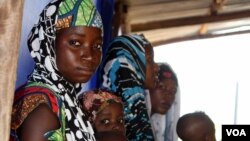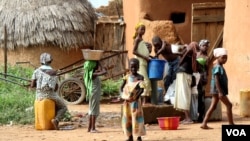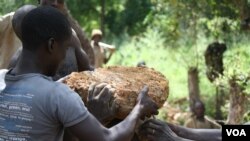ABUJA —
More than nine months after the funds were allocated, the Nigerian government has begun cleaning a village that could be the world's worst lead poisoning site.
Activists are cautiously optimistic that the move is the first step in a process that could save hundreds of children, but some health workers say, for the most vulnerable children, it is already too late.
Last May, activists celebrated when the Nigerian government announced it would put aside more than $4 million to clean up Bagega, a village in the epicenter of what is called the worst lead poisoning outbreak in history. In June, health workers sent out an email, saying the funds had been released and the clean-up would commence, after which, sick children could be treated for lead poisoning.
In October, VOA visited the village. No one was cleaning anything and health workers were beside themselves with grief. Children were still dying.
But now Doctors Without Borders mission head Ivan Gayton says the clean-up has finally begun and health workers are preparing to screen up to 1,500 children.
“Oh, it’s just an incredible relief," he said." We’ve been hammering away at this for a year. There were actually times that I lost hope. There were times that I didn’t think this would get done. That we’d have to just eventually walk away.”
Children in Bagega have been exposed to lead poisoning for years, Gayton said, and many may already be permanently disabled or too sick to save. Some activists also fear the money for the clean-up could suddenly disappear before the job is done.
Hamzat Lawal runs a local watchdog group called Follow The Money. He hopes his organization’s use of social media will keep the government funds flowing to the village, rather than getting lost in anyone’s pockets.
Corruption is well documented in this country, with billions of dollars worth of public funds being stolen in the past few years. And that is only what is documented. In the meantime, Lawal prefers to be optimistic.
“That means that the government of Nigeria is taking the public seriously," he said. "They’re taking its citizens seriously and they’re not stampeding on our human rights.”
Some villages in Zamfara State lost 40 percent of their small children when the outbreak began in 2010. Human Rights Watch says it also causes high levels of infertility and miscarriages among adults.
The lead comes from artisanal gold mining in an area that happens to be also rich in lead.
Miners crush rocks extracting gold ore and lead dust gets on their clothes and into the environment.
Miners say if they did not dig for gold, those children would live in abject poverty.
Activists are cautiously optimistic that the move is the first step in a process that could save hundreds of children, but some health workers say, for the most vulnerable children, it is already too late.
Last May, activists celebrated when the Nigerian government announced it would put aside more than $4 million to clean up Bagega, a village in the epicenter of what is called the worst lead poisoning outbreak in history. In June, health workers sent out an email, saying the funds had been released and the clean-up would commence, after which, sick children could be treated for lead poisoning.
In October, VOA visited the village. No one was cleaning anything and health workers were beside themselves with grief. Children were still dying.
But now Doctors Without Borders mission head Ivan Gayton says the clean-up has finally begun and health workers are preparing to screen up to 1,500 children.
“Oh, it’s just an incredible relief," he said." We’ve been hammering away at this for a year. There were actually times that I lost hope. There were times that I didn’t think this would get done. That we’d have to just eventually walk away.”
Children in Bagega have been exposed to lead poisoning for years, Gayton said, and many may already be permanently disabled or too sick to save. Some activists also fear the money for the clean-up could suddenly disappear before the job is done.
Hamzat Lawal runs a local watchdog group called Follow The Money. He hopes his organization’s use of social media will keep the government funds flowing to the village, rather than getting lost in anyone’s pockets.
Corruption is well documented in this country, with billions of dollars worth of public funds being stolen in the past few years. And that is only what is documented. In the meantime, Lawal prefers to be optimistic.
“That means that the government of Nigeria is taking the public seriously," he said. "They’re taking its citizens seriously and they’re not stampeding on our human rights.”
Some villages in Zamfara State lost 40 percent of their small children when the outbreak began in 2010. Human Rights Watch says it also causes high levels of infertility and miscarriages among adults.
The lead comes from artisanal gold mining in an area that happens to be also rich in lead.
Miners crush rocks extracting gold ore and lead dust gets on their clothes and into the environment.
Miners say if they did not dig for gold, those children would live in abject poverty.







